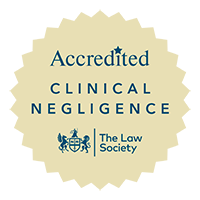Top ranked cerebral palsy claims lawyers
Boyes Turner’s birth injury solicitors secured a £31.5 million* settlement in a birth injury claim for a young teenager with cerebral palsy. Our client has GMFCS level 5 cerebral palsy with impaired mobility, speech and learning disability, and has a long life expectancy, but will always require 2:1 care.
Inaccurate intermittent auscultation (IA) monitoring in labour
Our client’s mother’s labour took place at the defendant’s hospital. Throughout the labour, our client’s (fetal) heart rate was monitored by the midwife using intermittent auscultation (IA). The medical records relating to the baby’s heart rate, as well as other timings and key events during the labour and delivery, were inaccurate and wholly inconsistent with our client’s HIE brain injury and condition at birth, but noted that for most of the labour the fetal heart rate was normal.
During the extended second stage of labour, the midwife noted an early deceleration, followed soon afterwards by a severe drop in the fetal heart rate which lasted a minute and then recovered. Correct treatment would have been to begin and continue electronic monitoring by CTG, which would have revealed fetal heart rate abnormalities, leading to earlier delivery which would have avoided or reduced our client’s disability. Instead, the midwife continued to monitor the fetal heart rate by IA throughout the labour and delivery.
Birth of distressed baby further delayed by multiple attempts at assisted delivery
The registrar was called to review our client’s mother after she had been pushing for two hours with no progress. The registrar performed a vaginal examination and, noting that the mother was exhausted, decided to deliver the baby by ventouse extraction. Following an episiotomy, the inexperienced, unsupervised registrar unsuccessfully attempted to deliver the baby by ventouse, and then, after extending the mother’s episiotomy, tried unsuccessfully to deliver the baby by forceps and again by ventouse. The consultant was called and easily delivered the baby with forceps, noting the presence of lots of fresh meconium.
The baby was floppy, acidotic (indicating recent oxygen deprivation) with a very low heart rate at birth, but was not thought to meet the criteria for therapeutic cooling. Ultrasound and MRI scans later confirmed HIE brain injury caused by a period of chronic partial hypoxia with an additional episode of acute profound hypoxia in the minutes leading up to birth.
Birth injury claim leads to admission of liability and interim payment
We requested our client’s medical records and were advised at that time that NHS Resolution had already instructed solicitors to defend the claim. We investigated the claim and after receiving supportive expert evidence, served a letter of claim based on the negligent monitoring and management of the mother’s labour and delivery, and the materially indivisible brain injury and disability that the acute profound hypoxic episode caused to our client during the resulting delays. NHS Resolution and their solicitors failed to respond to the letter of claim. We issued proceedings and NHS Resolution finally admitted liability in the defence to the claim, enabling us to obtain a liability judgment for our client.
A £250,000 interim payment met our client’s immediate needs for case management, therapies and suitable rented accommodation whilst we worked with our client’s family and our experts to value the claim.
Settlement provides £7.1m lump sum plus guaranteed annual payments
We resisted repeated attempts by NHS Resolution to defer RTM negotiations until immediately before the assessment of damages trial in February, which would potentially have risked a significant reduction in our client’s compensation for lifelong, extensive future care costs from anticipated changes in the personal injury discount rate. At RTM, we secured a settlement which provides our client with a lump sum exceeding £7.1million plus annual PPO payments rising to £400,000pa for care and case management, with additional PPOs for Court of Protection deputyship costs and net loss of earnings.
Our client’s privacy is protected by an anonymity order.
*capitalised equivalent
If your child has cerebral palsy or neurological disability as a result of medical negligence, or you have been contacted by HSSIB/MNSI or NHS Resolution, you can talk to a solicitor, free and confidentially, for advice about how to respond or make a claim by contacting us.
They have a great deal of knowledge and expertise, and client care seems to be their top priority.
Chambers Guide to the Legal Profession
Contact our expert Cerebral Palsy solicitors today for support with your claim




